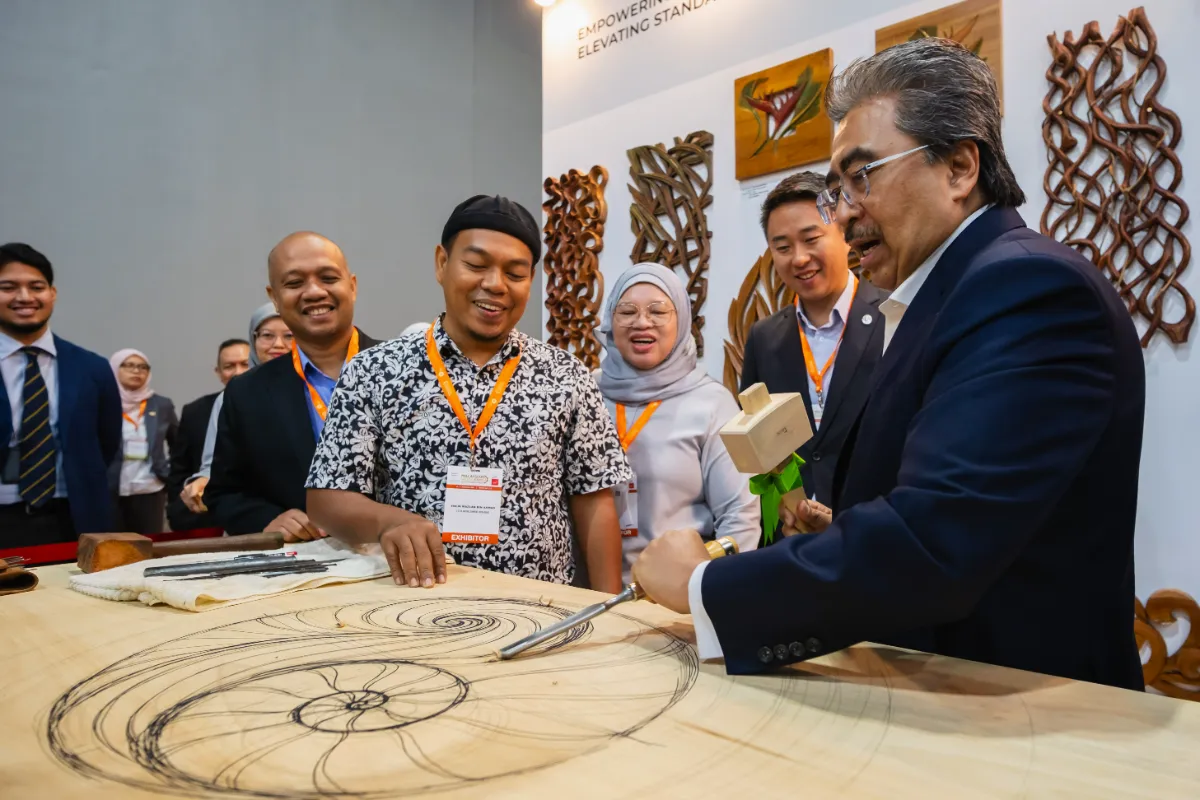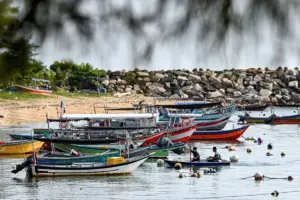KUALA LUMPUR: Malaysia remains steadfast in balancing economic growth with environmental sustainability, particularly in developing its domestic wood industry.
Plantation and Commodities Minister Datuk Seri Johari Abdul Ghani said the sector continues to play a key role in the nation’s export portfolio, alongside major commodities such as palm oil and rubber products.
Speaking to reporters after launching the Malaysian Wood Expo 2025 (MWE 2025) today, Johari said Malaysia has long recognised the wood industry’s contribution to the economy while maintaining its global commitment to sustainable forest management.
“Wood is one of the key resources we derive from our forests, and Malaysia is committed to protecting these natural assets. Despite development pressures, we have maintained more than 50% of our land area under forest cover – a target we share with Indonesia.”
Under the government’s sustainable forest management practices, designated areas are reserved for responsible timber activities, ensuring that economic utilisation does not come at the expense of long-term ecological balance.
On export performance, the minister noted a slight dip in the sector’s value this year.
“In the first nine months of 2025, wood exports recorded RM16.2 billion compared to RM17 billion in the same period last year, a marginal decrease. However, demand for wood-based products remains positive,” Johari said.
He added that current trends indicate consumers are becoming more price-conscious, opting for affordable yet sustainable wood products.
This shift, Johari said, reflects a healthy market adjustment rather than a decline in industry performance.
“People are now more selective – they want quality products at reasonable prices. While export value may fluctuate slightly, overall usage and demand for wood products remain strong.”
The two-day MWE 2025, the third edition in the series, is a premier platform for global timber players, manufacturers, designers and buyers to connect, collaborate and innovate.
Complementing the MWE 2025 exhibition is a timber conference featuring renowned international and local experts who shared insights on global trade trends, market opportunities, sustainability and design innovation. The MWE 2025 edition continues this tradition, highlighting Malaysia’s growing presence in the global timber industry and promoting sustainability, innovation and design excellence.
Johari said Malaysia’s timber exports reached RM22.9 billion in 2024, making it the country’s third largest export product in the agricommodity sector, behind palm oil at RM114.4 billion and rubber at RM33.7 billion.
In the first three quarters of 2025, timber exports have seen a decline from RM17.1 billion in January to September 2024 to RM16.2 billion in the same period this year.
However, despite the geopolitical upheaval affecting global trade, timber export volumes have increased by 7.2% to 2.9 million cubic metres in 2025, compared to 2.7 million cubic metres in January to September 2024.
“Combined, our trade performance reflects an evolving market landscape, underscoring the need for continued innovation and diversification to strengthen the industry’s long-term competitiveness.
“As a key economic pillar under the National Agricommodity Policy 2021-2030, the government aims to enhance sustainability elements and competitiveness within the timber industry.
“This is essential to ensure that the industry continues to generate economic value while upholding Malaysia’s strong commitment to environmental sustainability and global market relevance,“ Johari said.
He also noted that the Malaysian Timber Certification Scheme (MTCS), endorsed by the Programme for the Endorsement of Forest Certification ensures that timber harvested from Malaysia’s forests meets environmental, social and economic standards.
“As of October 2025, 5.85 million hectares of Malaysian forests are MTCS-certified, placing Malaysia among the Top 10 countries globally with the largest PEFC-certified forest area, a remarkable achievement as the only tropical country on that list. This demonstrates to global buyers that Malaysian timber is sourced legally and sustainably, in line with stringent market requirements.
“To secure long-term raw material supply, the Industrial Tree Plantation Programme is essential to provide a steady and sustainable source of raw materials. This not only reduces pressure on natural forests, but also supports the growth of our downstream industries,” Johari said.
To date, an estimated 268,677 hectares of forest plantation have been planted for raw materials for the timber industry, he disclosed. “Our goal is to ensure Malaysia’s timber industry continues to grow responsibly and sustainably and remains globally competitive.”
He said Malaysia is well-positioned at the heart of Asean, with strong trade links, a credible certification system, and a solid reputation for sustainability. “To our international buyers, Malaysia stands ready to serve as your trusted gateway to the dynamic Asean timber market,“ Johari said.
Post Views: 3






